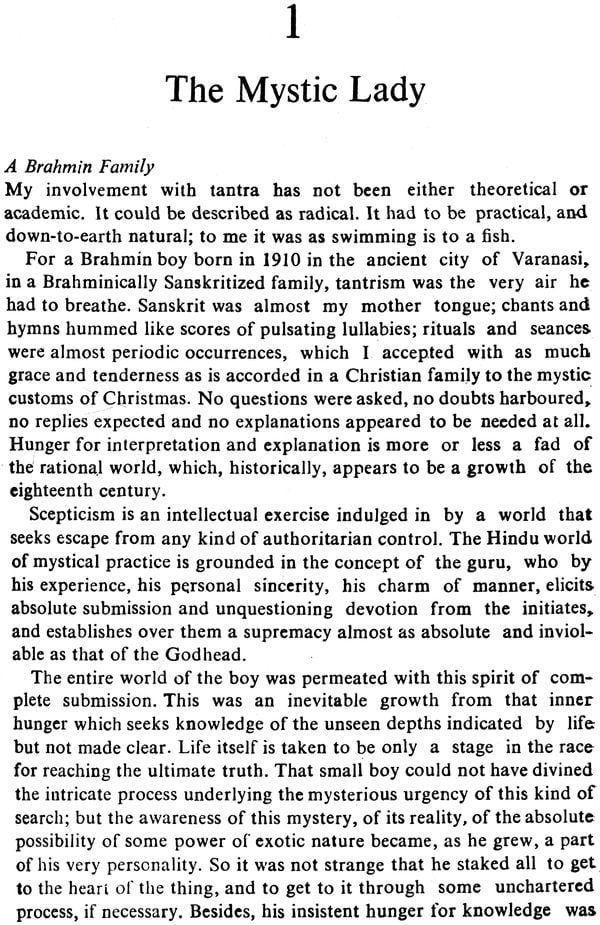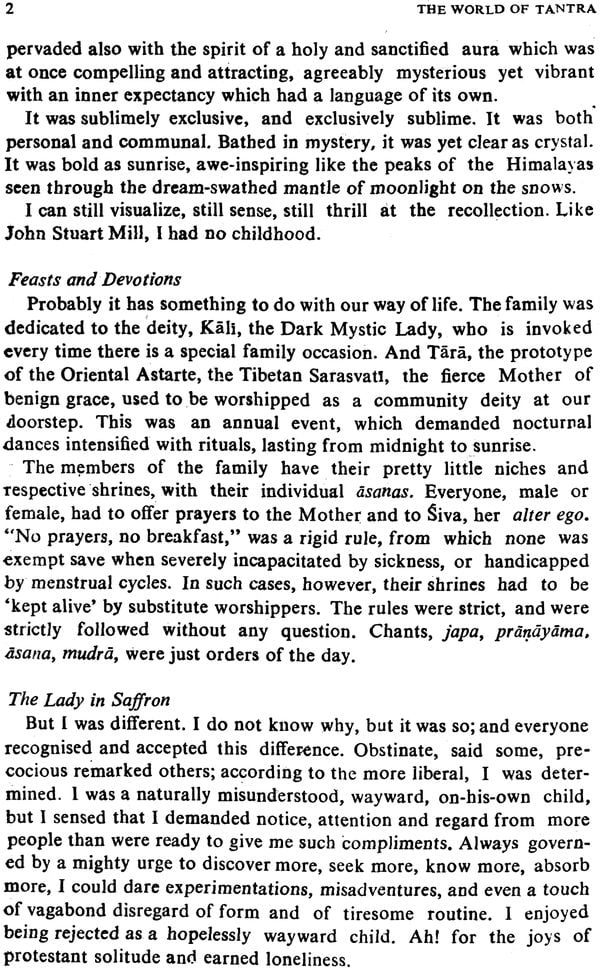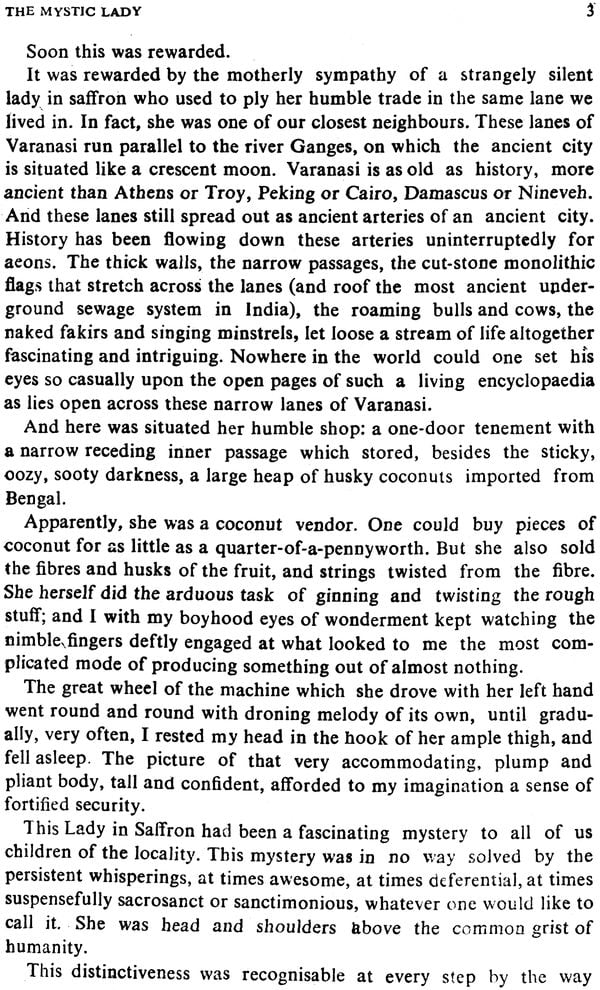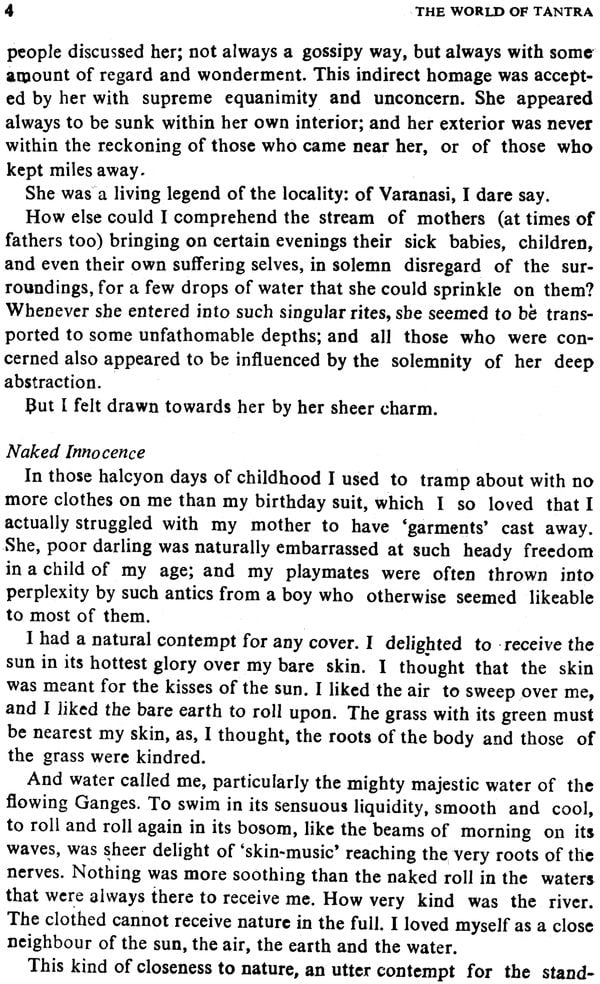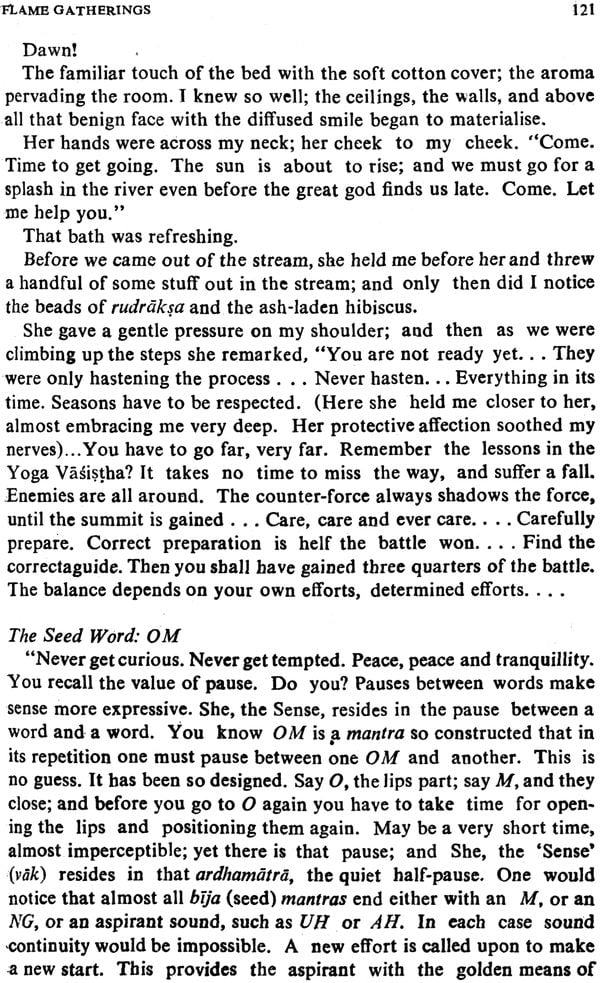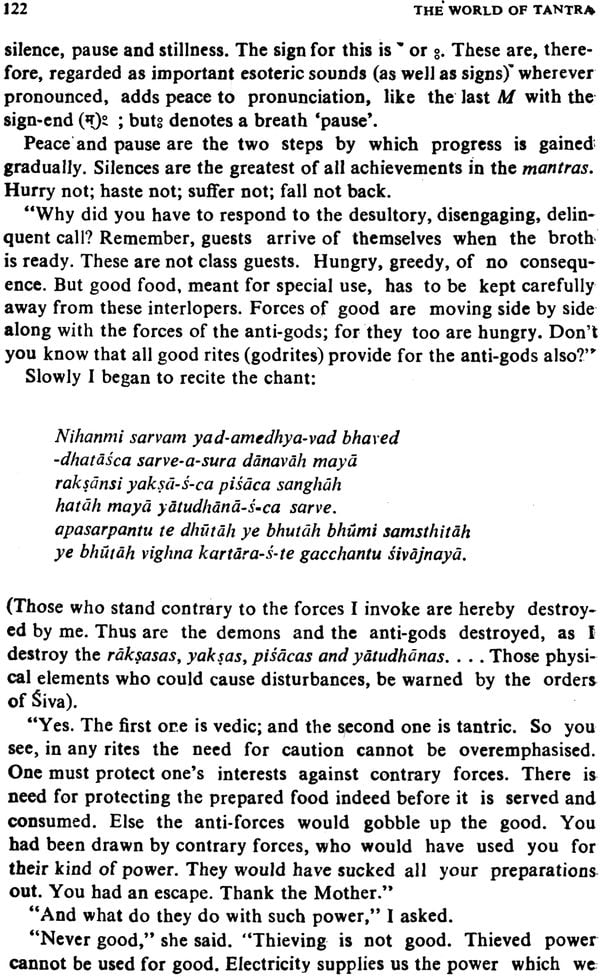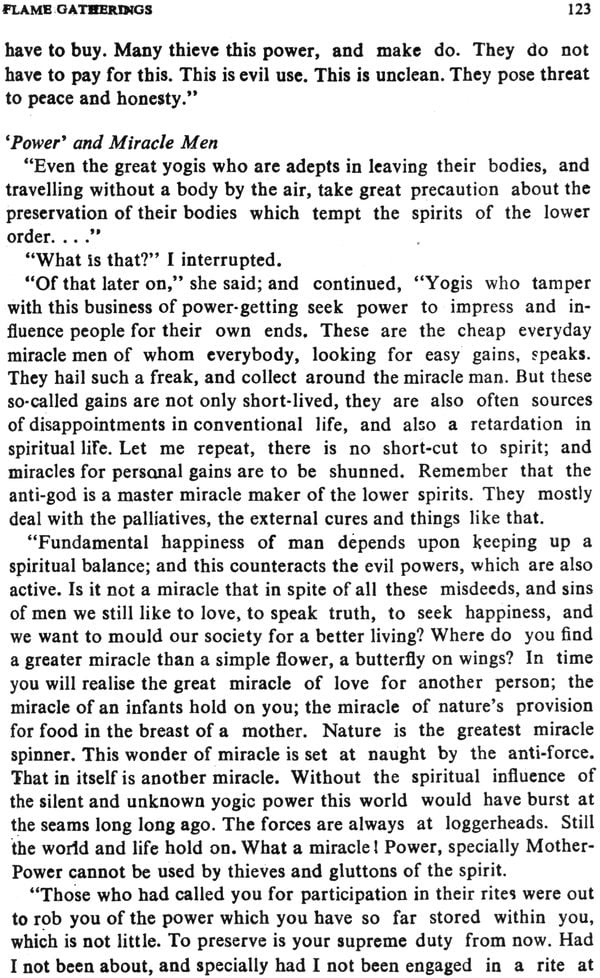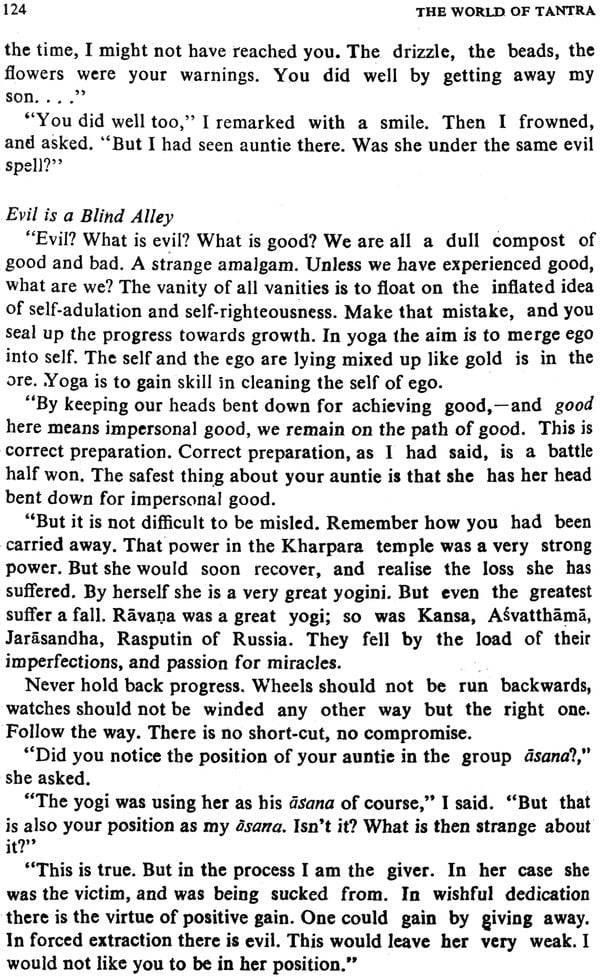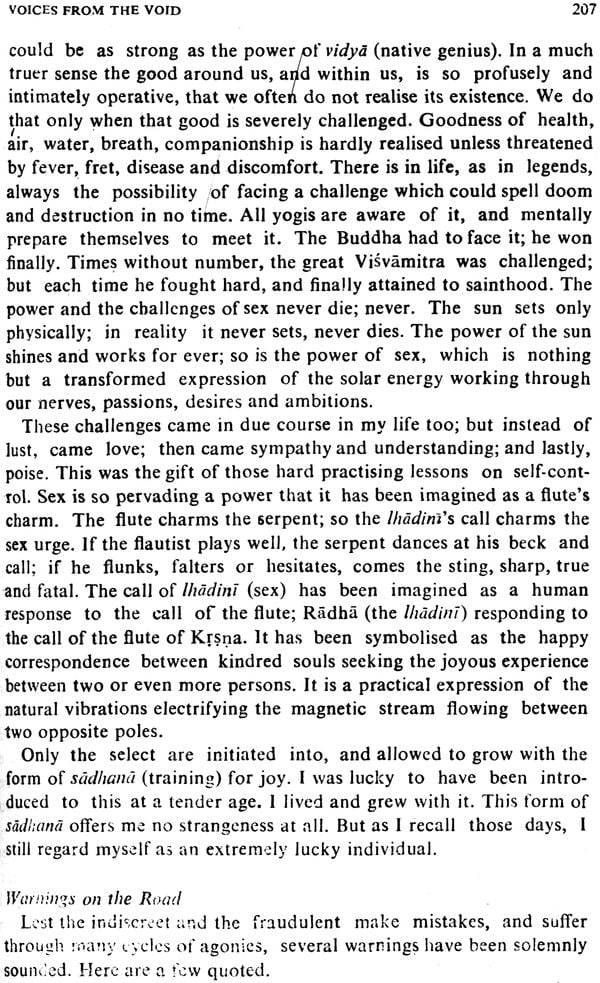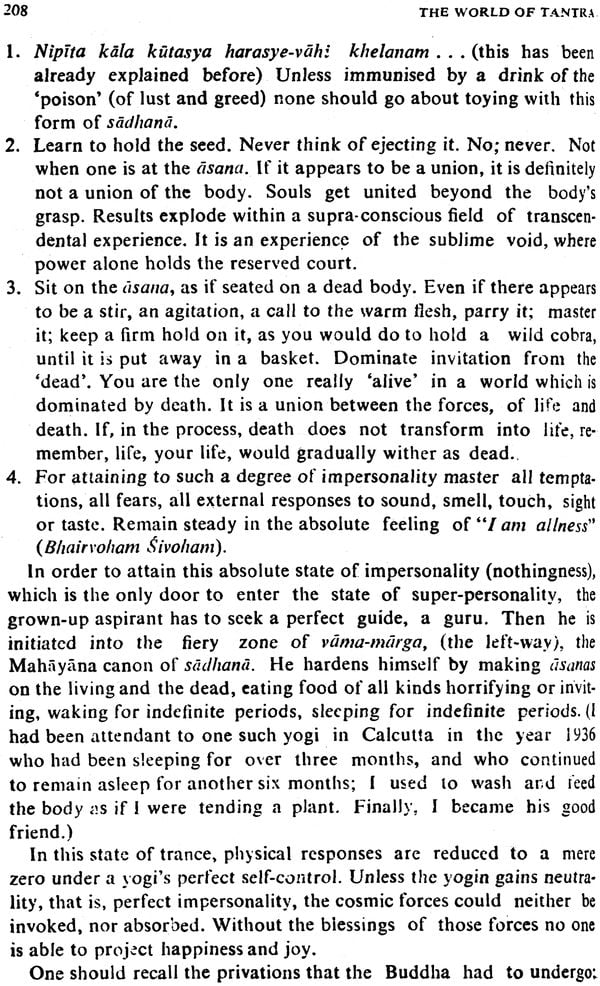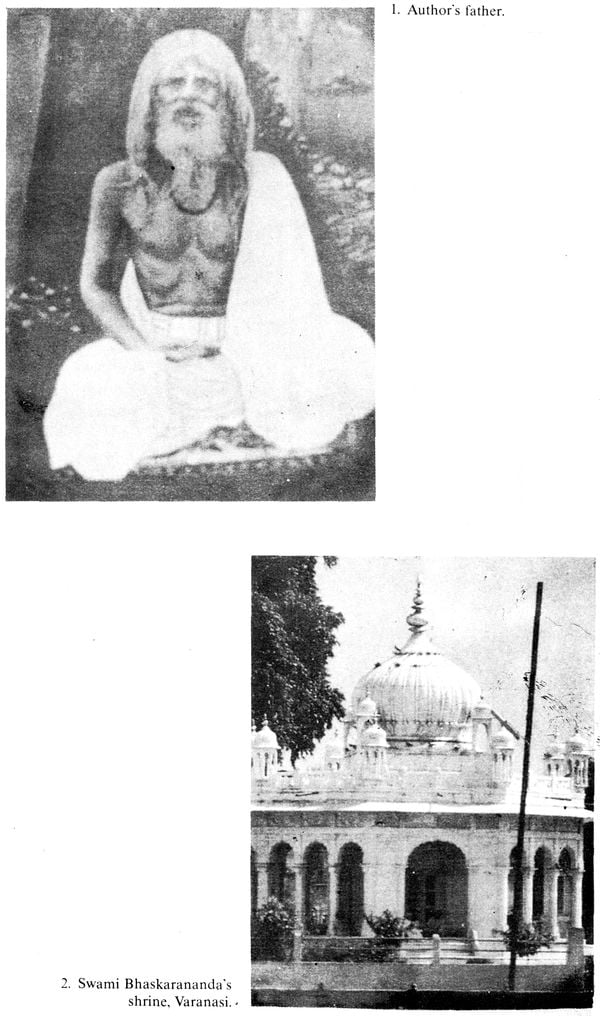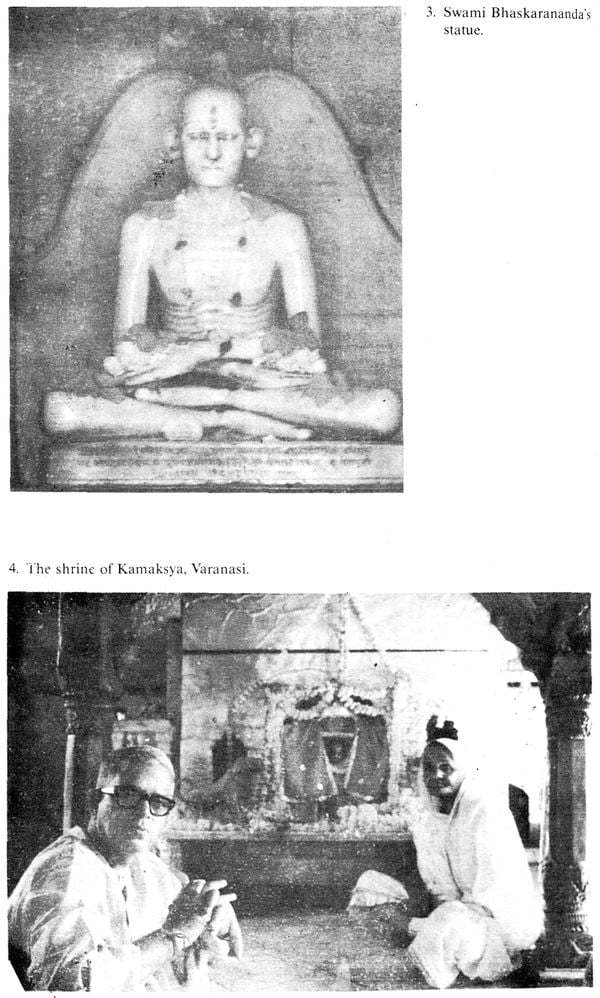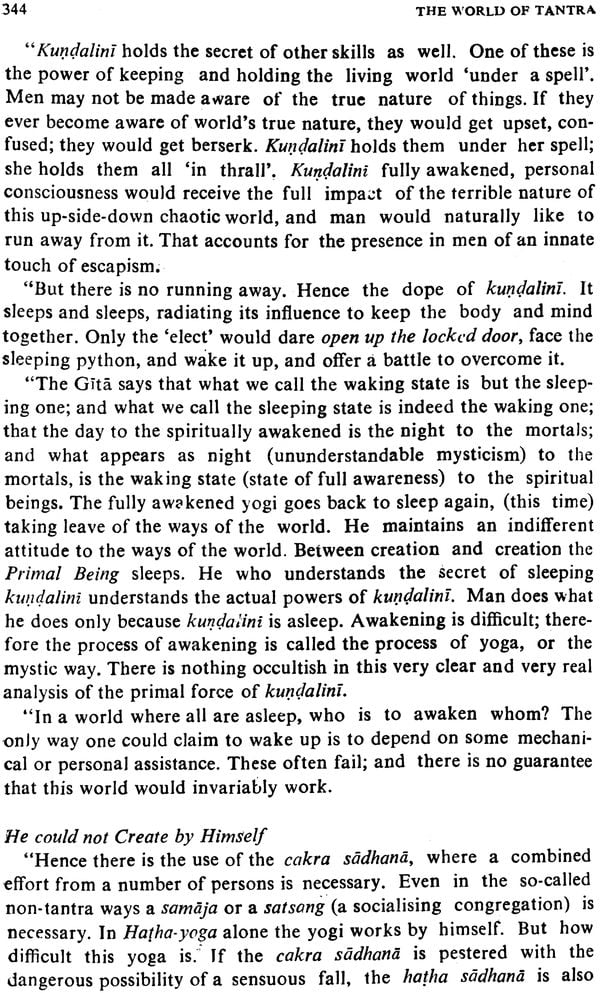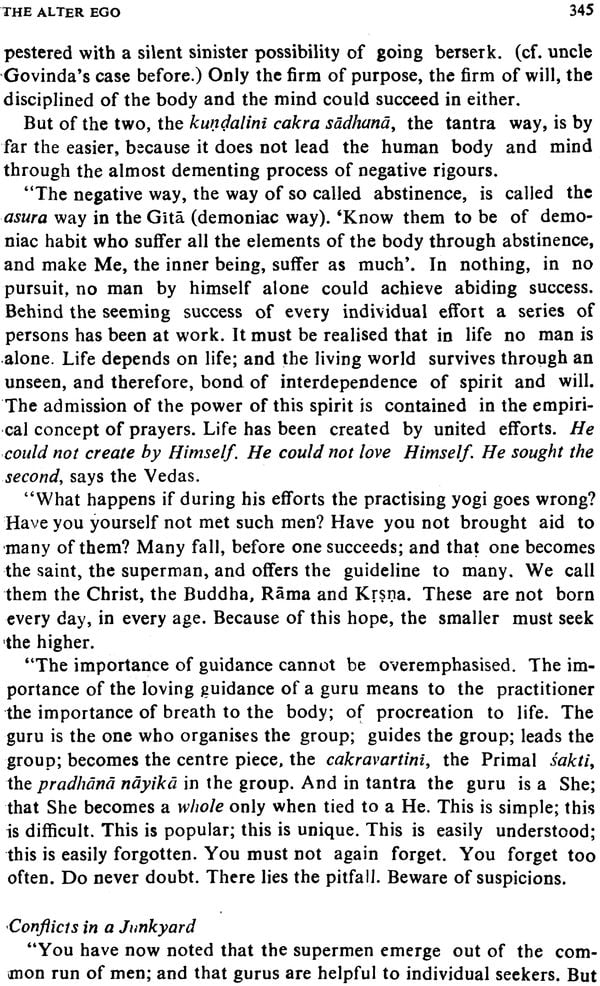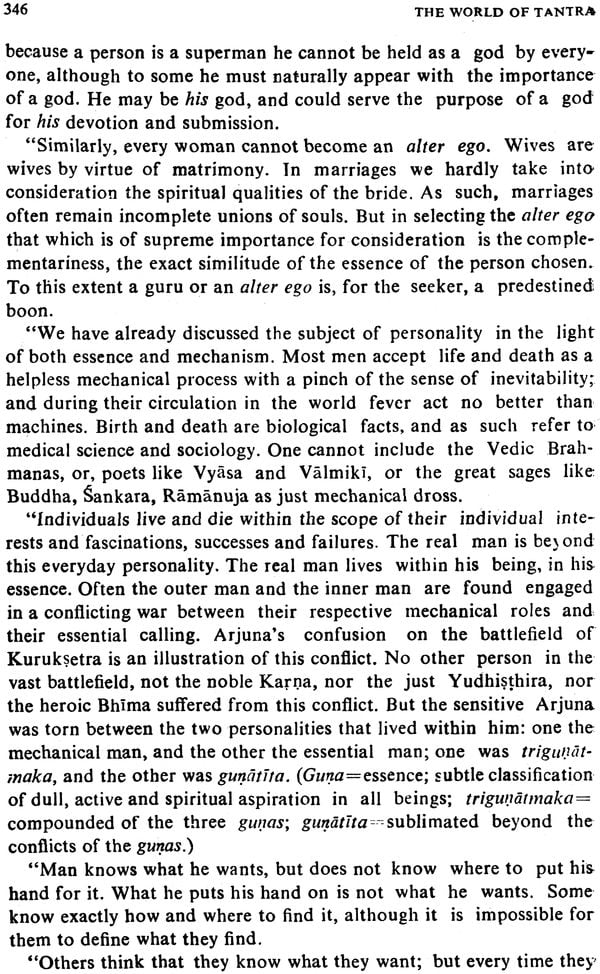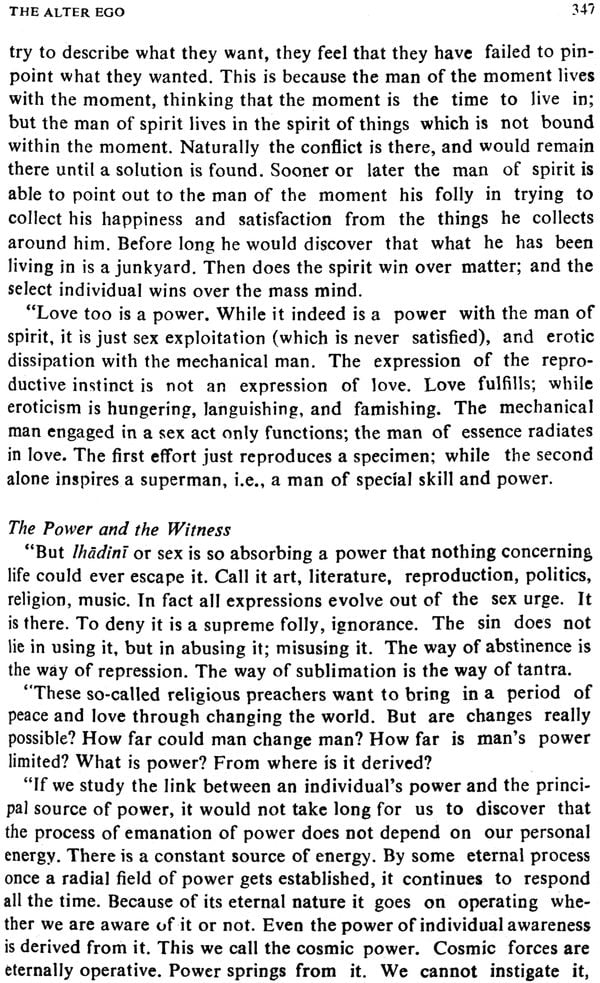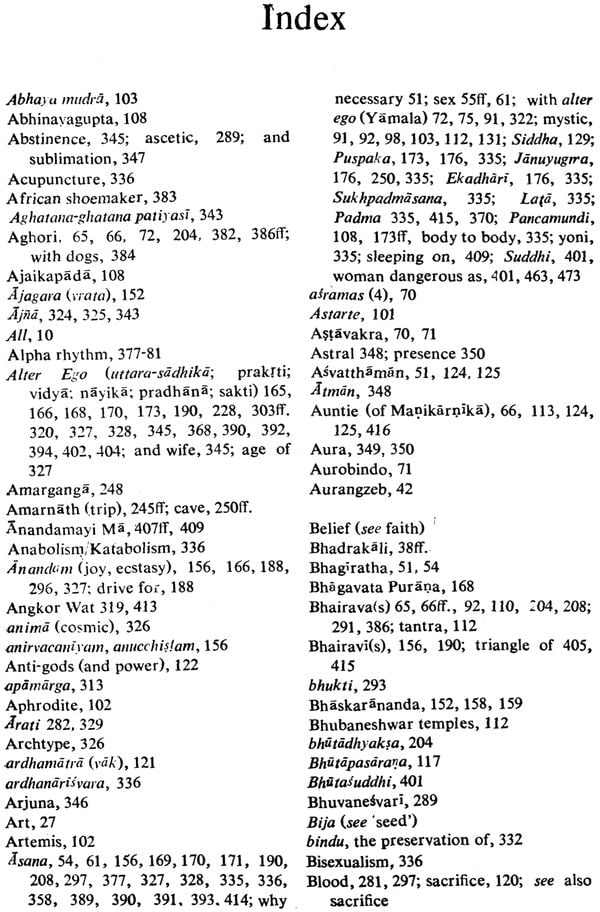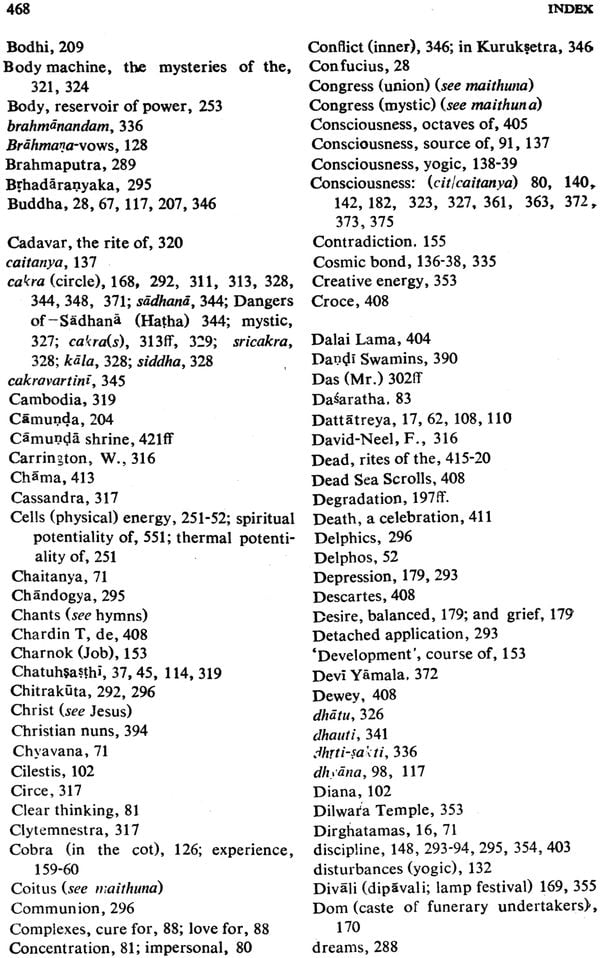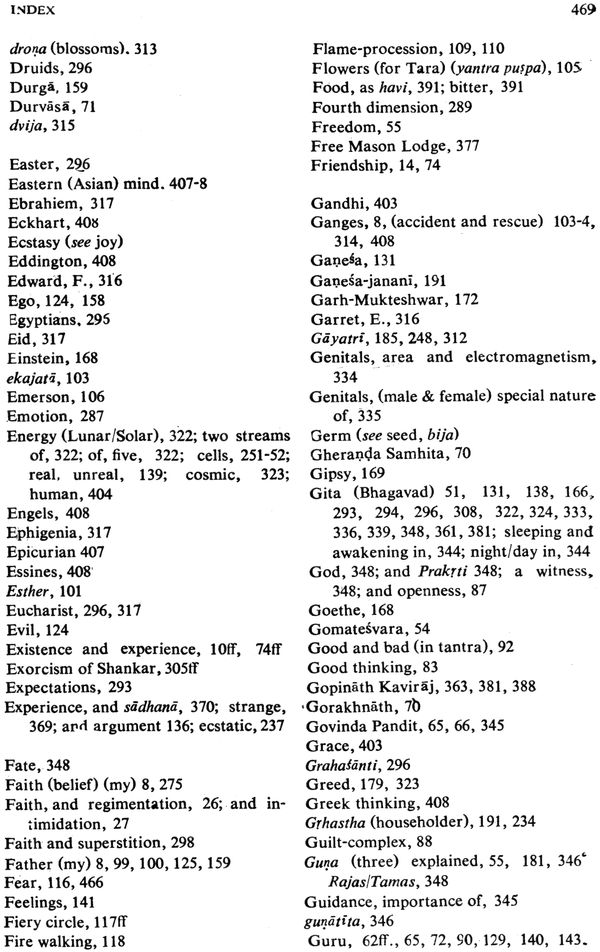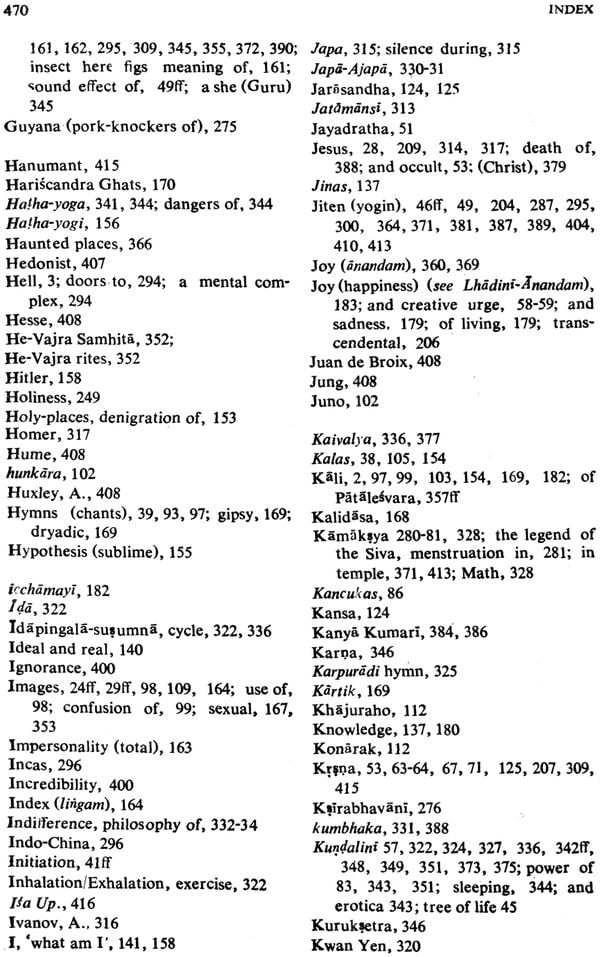
The World of Tantra
Book Specification
| Item Code: | IDK042 |
| Author: | B. Bhattacharya |
| Publisher: | MUNSHIRAM MANOHARLAL PUBLISHERS PVT LTD |
| Edition: | 2014 |
| ISBN: | 9788121509688 |
| Pages: | 476 (B/W Illustrations 18) |
| Cover: | Paperback |
| Other Details | 8.5" X 5.5" |
| Weight | 580 gm |
Book Description
About the Book
It is a faithful presentation of personal experiences of a devoted man who has been throughout his life of 76 years searching for receiving an answer, an understandable logic behind those mystic events before which logic stands spell bound. This personal records-secret, mind-boggling, enigmatic-none the less reserve for the reader an unfailing touch of reliance. Man stands here face to face with the mystery, which takes the mind above matter, and wonderment gasps although the Hamlet like assurance comes in time to point out confidently to 'more things between heaven and earth'. Chapter by chapter, the author unfolds layer after layer the secrets of the Tantra world, as he has found himself in, at times to satisfy his quest, at times as just a beam of blessing.
The personal note of these pages, together with the lessons in Tantric practices, some sweet and startling, some horrid and blood curdling, make this book an addition to the authentic report of this much maligned but equally intimate world. Those who want to profit and learn of and about what could be held in store by Tantra will find The World of Tantra a secret mind of relevant information at first hand.
About the Author
B. Bhattacharya, born in 1910 in Varanasi, received his first education in traditional toles in Sanskrit and further did M.A. (English) from Allahabad University. He spent the best period of his life as an educationist in Guyana and Trinidad (West Indies).
His other works, Saivism and the Phallic World, 2 vols. (1993) and Varanasi Rediscovered (1999), both published by us are well known. The present work shows the range of his reach in the mystic sphere of Tantra.
Preface
Tantra is an intimate subject; Tantra is an open and universal subject Tantra cannot be narrated; neither described. Tantra is to be communicated, conveyed and shared. Tantra is not story, gossip, hearsay; Tantra is history, tradition, and primitive. Tantra is personal, practical, and empirical; Tantra is social, communal, and tribal. Tantra is objective-subjective. Tantra is materialistic idealism; realistic mysticism. Tantra is the Mother, Madonna, Gaea; Tantra is Camunda, Kali, Circe, Erzulie.
Because it is extremely difficult to communicate Tantric experiences, because an effective language for truthful communication of the mystic nuances of Tantra has not yet been forged by man, I was more than reluctant in expressing myself in this complex field, specially in the first person. Accuracy, precision and clarity are always victims of autobiographical representation. In this case too, actual facts are destined to undergo some misrepresentations.
But friends had been insisting on my telling the tale, which, in their estimation, would be of immense benefit to serious students of Tantra. I am completely unaware if such is the case; if anyone would indeed be benefited; but it was no longer possible to resist the pressure. Further keeping off seemed useless. Finally I decided to give way.
Remoteness of the events narrated, together with the gray age of the narrator, and the absence from life of some of the characters involved offer me some protective cover, so that I accept the challenge of the undertaking and settle for the venture. The difficult task of presenting in the first person intimate autobiographical details of incidents and events, which involve others as well, makes the venture delicately embarrassing. But in this I depend entirely on the charity of the reader.
I Only hope that the decision of revealing these treasured secrets stands justified by the gains of the seekers, who, I know, always look for assistance from every possible source for achieving success in the world of Tantra.
Since the explosion of the atom bomb, particularly since the Vietnam flasco, an era of nuclear competition has gripped the so-called affluent, aggressive and militant nations. An almost inexplicable pall of mistrust has been driving these self-styled dispensers of world peace to the dangerous horders of cynical desperation.
Queerly enough the inherent disregard reflected by this callousness of the affluent powerful has cast a gloom of utter pessimism over the bright and young minds of their society. Despite the claims of their affluence, power, progress and scientific advance, gradually the growing youth has been getting disenchanted by these tall claims, which they know are nothing more than the empty growls of old hounds bent upon tearing themselves apart.
This is not the place to dissect and analyse the causes of this deplorable malady, which has been engaging the thoughts of social thinkers and philosophers.
But our subject is concerned with this phase of the changing times. Simultaneously with the growth of this despondence and cynicism, a taste for the mystic and the occult has characterized the mental fascination, the spiritual quest and the physical degeneration of our growing stock. A mad craving for some kind of inner freedom (picturesquely expressed by the escapist howling word trip) has overwhelmed the beleagured youth.
He longs for coming into grips with an easy road to escape into the realms of the romantic mysterious, where to be, he hopes, is to forget the problems that stare him in the face.
Amongst other means of escape, he has turned his mind to that proverbial mysticism of the East, which, in times bygone had lured the Greek and Roman youth, until a Dark Age had wiped out the glory that was the Classical Age. Traditionally, with historic precision, whenever the West has looked for spiritual and cultural sustenance, it has looked to the East.
In tune with that historic tradition, the present post atomic age too, having run into a crisis of spiritual vacuum, looks towards the East for an answer. Not the growth of science and commerce, nor the fantasies of the atomic age and its residual threat to human existence, nor the revolutionary ideas of neo-socialism has been able to contain this zealous search for an instant remedy to the crisis that is about to overwhelm man's mind and body.
Tricksters have tried to pass off as saints and magic men, who through their dubious devices promise quick, hand-to-hand remedies for all such mental and spiritual maladies. A readymade package tour to an escape to total freedom is generally held out by many 'experts' from the East; and history would have to record once again that of all the pretending rogues, the spiritual Tartuffes of society find their victims easy lambs for a senseless slaughter.
Almost all the Western capitals could boast of flourishing spiritual shops where the credulous youth burn in their search for an everelusive world of personal freedom.
This situation has encouraged a spiritual market to flourish unchecked, and flood the guileless minds of the seekers with books, charts, diagrams, tankas, besides the scores of instant gurus who go about trading peace and tranquility. The more remote, the keener; the more occultish, the hotter; the more eerie, the merrier.
Minds genuinely in search of solace and strength rush towards the primised peaceful goal, where there is love for the world and fulfillment for life; where the elders do not set a double standard, and dupe their juniors or trick them into going for global wars in the name of peace.
This crisis of the spirit of man has been fully exploited by cheap pedlars of spiritual calm. The spirit of man hits the lowest bottom when consummate tricksters make the agony of the of the soul a bargaining commodity for personal profit and power.
Tantra, unfortunately, has been one of those chosen commodities on the shelves of the spiritual traders. Books on this very serious and time-honoured mystic way deluge the market; and yet another addition to the heap could hardly be justified. On the face of it the attempt is suspect.
As these thoughts pass through my mind, I feel I have so far rigidly tried not to succumb to the persistent requests from friends to record these experiences. These, they feel, are treasures of a specific nature of data for aspirants who search for first-hand facts.
As I submit to this insistence, (and perhaps also to an author's neurotic itch for public correspondence) I must sound immediately a note of warning.
Those who are looking for any theoretical guidance in or metaphysical explanations of Tantra or Tantric events would find this book entirely disappointing. It does not propose to offer any messianic panacea to the souls in distress, or to the spirit in turmoil.
The World of Tantra does not pretend to teach anything; or preach any message. It does not offer any short-cut map to tranquility. It entertains no presumptuous claims on the sophistry of the art of the masters, or the wisdom of the philosophers, or the secrets of the wizards and the mystics.
It records in the first person some complex personal experiences of a common seeker along the Tantric way, the way of the deadly coilof the female serpent. This book claims for its merit no special kudos. In fact it has nothing to relate except to expose a genuine heart-to-heart appreciation of a fellow traveler's mood of sharing and comparing extraordinary happenings, in the sacred spirit of exchanging experiences with a sympathetic brotherhood met at a spiritual caravanserai.
As such, the reader is requested to lay his trust on the veracity of the narratives. Time and distance must have inevitably driven the details into an area of mist and fog.
Some of those objects, seen through the fog of a fading memory, must look, of course, larger, dimmer, out of proportion or perspective. Never would they appear in their own nascent purity. Some of the incident have been passed over, some have worn thinner, some have cast longer shadows and deeper colors: but by and large the author has tried his best to keep close to the facts as watched then, and recollected now.
The incidents described are admittedly difficult to be 'believed'. Indeed, taken at their face value they are likely to pose a challenge to human credulity. If the reader takes them to be nothing better than a yarn, I shall be the least surprised, or hurt. As the narrator, indeed, I feel the least bothered. Because I had watched these, incredible incidents with my own eyes, and because I have heard some of these things with my own ears, I felt obliged to narrate them. It is not for me to offer justifications, or formulate rationalizations for their credibility; neither do I possess the mental or intellectual capacity to do so. That kind of exercise falls within the court of the theosophists and the metaphysicians.
Since I do not attempt to hold a torch to credibility of the narratives, I owe it to my readers that I give them the option of discrediting the entire monograph, and declare the exercise as a piece of howling figment. I shall not, therefore, feel offended; neither shall I deem my efforts as casting seeds in a windless desert waste. In narrating them, in bringing these reports to the notice of the deserving, I shall be fulfilling a mission in my life, which is running through its last lap. I am pretty sure that there are many who have need for such reports of first-hand experiences in a field of enquiry which remains until this day, amidst all this fadistic hullabaloo about 'a scientific outlook', an absorbing area of discovery, rediscovery and self-discovery. Tantra and the Tantric truth still lies closeted within a mystery room, the keys of which are difficult to come by.
The mystery of the unknown has yet some charms left. The most profound of the scientific enquiries, ancient and modern, (from Atisa Srijnana and Nagarjuna to Thales and Empedocles; from Sankara and Abhinavagupta to Faust, Schopenhaur, Blake, Blavatsky, Oliver Lodge and Tagore) have been addressed to the courage of breaking into the closed doors of the world of Tantra. To such kindred minds the book might not be entirely useless. Tantra, after all, has been handed down to us through this stream of traditional recordings of events experienced.
Whatever is said and done, in spite of the best attempts, time is bound to take its toll, and certain understatements, together with many overstatements, as also instances of wrong emphasis, rhetorical excess must have embarrassed the narration. A writer is a human being; in spite of his determination to stick to sheer objectivity, his subjective presence is bound to cast shades on the mirror of life's moving events, specially when the subject itself offers to much details verging on the romantic and the eerie.
Apart from those blemishes in narration, and minus the literary flourishes, what has been stated, incident by incident, chapter by chapter, is nothing but fact, yet alas, not the whole fact. The whole fact shall always remain hidden inside the mystic darkness of the legendary 'cave' and the charm of Tantra would always continue to lure the aspirant towards it, and drive him mad for securing the proverbial 'golden key' to the 'cave of mystery'.
Granted that one favour, viz., acceptance of the factual correctness of the narration, the reader is assured of the relative truthfulness of the 'things that happened' before the eyes of a person who had been trained from his childhood to keep his eyes and ears alert for receiving the flitting messages from the wide extending shores of the mystic continents.
| Foreword | ix | |
| Preface | xiii | |
| 1. | The Mystic Lady | 1 |
| 2. | Initiation | 17 |
| 3. | Areas of Sin | 45 |
| 4. | A Strange Nocturne | 93 |
| 5. | Flame Gatherings | 115 |
| 6. | The Female Factor | 152 |
| 7. | Voices from the Void | 195 |
| 8. | A Pack of Four | 231 |
| 9. | Illusion and Reality | 262 |
| 10. | The Alter Ego | 302 |
| 11. | The Virgin and the Holy Family | 357 |
| 12. | Moth for the Star | 389 |
| Glossary | 459 | |
| List of Anecdotes | 464 | |
| Index | 467 |
